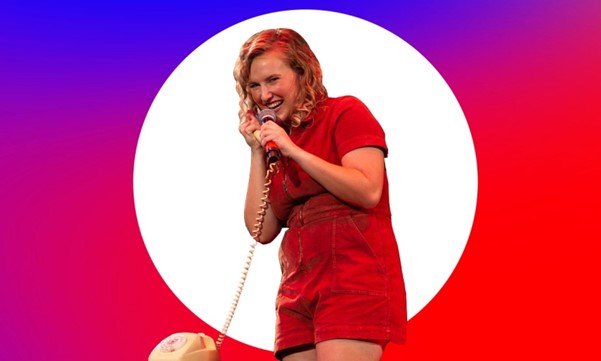
Lawyer and cabaret performer Millicent Sarre uses humour to make pointed and purposeful critiques in her returning Adelaide Fringe show 'Opinionated'.
Millicent Sarre’s one-woman cabaret, Opinionated, takes social commentary on feminism, activism, and the patriarchy to another level, through catchy lyrics and the performer’s larger-than-life stage presence.
On her website, Millicent refers to herself as a “Cabaret Artist, Music Theatre Performer, Singer-Songwriter, Vocal Coach, and Professional Feminist™”, which are all talents she uses to entertain and educate her audience in her witty hour-long cabaret show.
She spoke with us about being opinionated while also getting your message across.
How does it feel to have Opinionated returning for a second year at the Fringe?
It’s special because this is my home city and it’s a festival where I feel really comfortable and confident debuting material. I feel that I’ve built up a little bit of familiarity with the crowds and the attendees, and it’s really nice to feel like I have a support network here.
How has your background in cabaret and musical theatre influenced your exploration of feminism in Opinionated?
I have become more confident finding the humour in feminism, which is a bit funny because I think feminist comedy sounds like an oxymoron and people are scared to make jokes about contentious issues. But if you’re able to laugh at the absurdity of injustice and inequality and make the butt of the joke about the real backwards views about progress, women’s rights, or laws that we still have, that can be a very powerful tool. I’m realising that the comedy in my work is really important because if people can laugh in live performance, it puts your walls down and you can feel that people are also letting go.
How does comedy help to engage and connect with your audience?
The fastest way to connection is through laughter. I’ve got just under 60 minutes to engage with this audience and try to give them a sense that they know me to some degree, to the point that I feel comfortable sharing some really personal stuff. But I also want them to feel receptive enough to take away the social justice messages.
You aim to be as intersectional and inclusive as possible when talking about feminism. Why do you think this is important?
I’m very aware that I cannot speak for everyone’s experience. I am really privileged in most aspects of my identity, and people who don’t have privilege have a very different experience of gender inequality. I’m constantly conscious that my experience comes from a lens of privilege and I want to acknowledge that, because I don’t want people in other marginalised groups to feel further marginalised. I want to recognise that transphobia, queerphobia, racism, white supremacy, ableism and fatphobia are common and intersect with sexism and misogyny. I want my work to be as inclusive and understanding as possible to the fact that there is a plethora of experiences that my experiences don’t cover and that I don’t understand, but that I want to acknowledge.
How do you represent other issues, like consent culture, rejection of diet culture, misogyny, diversity, and inclusivity?
They all have a little section in the show, like rape culture was the crux of Friendly Feminism (Millicent’s 2020 cabaret). When I wrote Opinionated, I wanted to find something that I was just as fired up about and that would have enough of an emotional impact for me to write a whole show about it. That was about diet culture and body image for me. There are expectations that we put on women to look a certain way and the way we are so deeply shamed for existing outside of those norms. It’s a rigged game – no matter how much you change yourself to fit these ideals of beauty, those norms are going to shift anyway.
You’ve studied many things – from law to music. Do you think your knowledge in different areas has helped you as a performer, feminist, and writer?
Definitely. I don’t think I would be game to talk about social justice issues if I didn’t have a bit of legal background to back it up. Also, it’s just great comedy material – I crack jokes and brag about being a lawyer every five seconds. But I do think that having a fairly good understanding of the legal and justice system from having studied law does empower me to talk with some moderate level of authority around consent laws and anti-discrimination.
What do you hope your audience will take away from your show?
I’ve had a lot of people struggling with disordered eating and body dysmorphia who have reached out and told me how significant the material had been to them. Somebody once told me that they had struggled with their eating for a long time and after seeing the show, they had ice-cream. That’s what I care about the most – people recognising that their physical form is not a reflection of their worth and that they have so much to offer the world.
Opinionated is at The Virago at Gluttony from Friday 17 February to Sunday 5 March. For more information visit the event page.
Words: Chelsea Lancione


